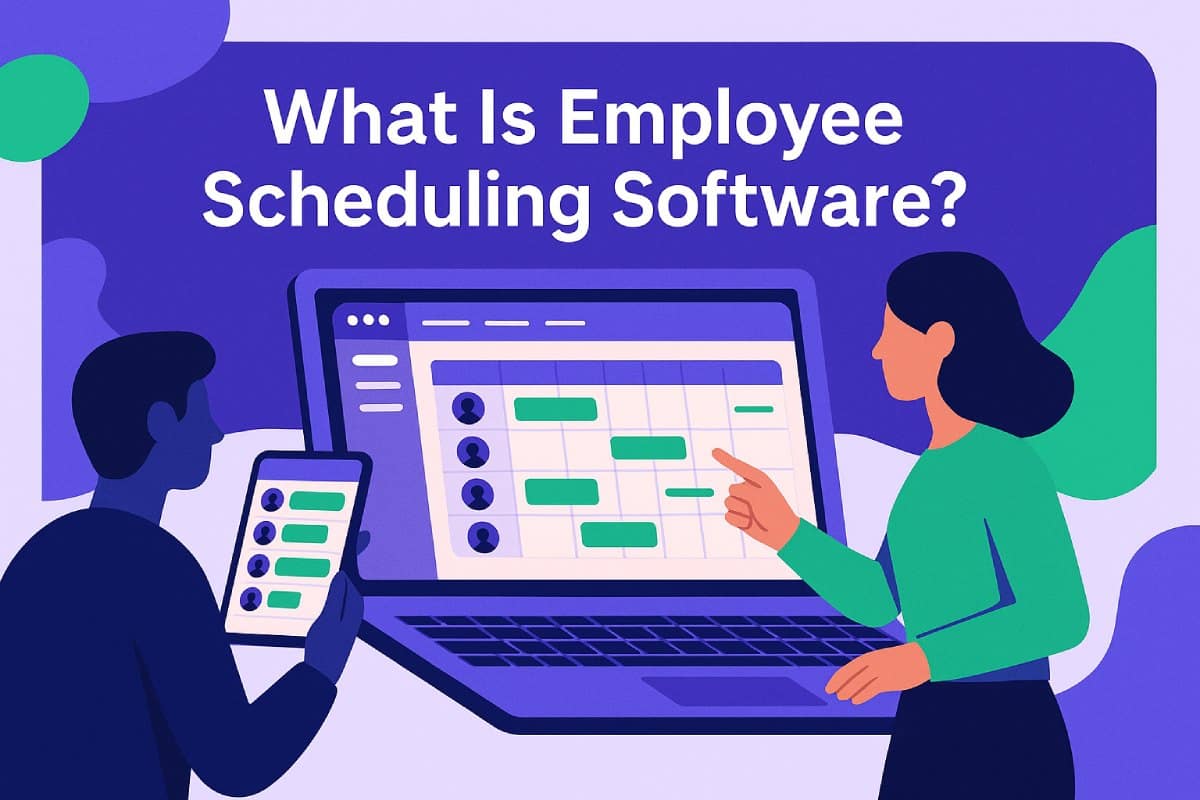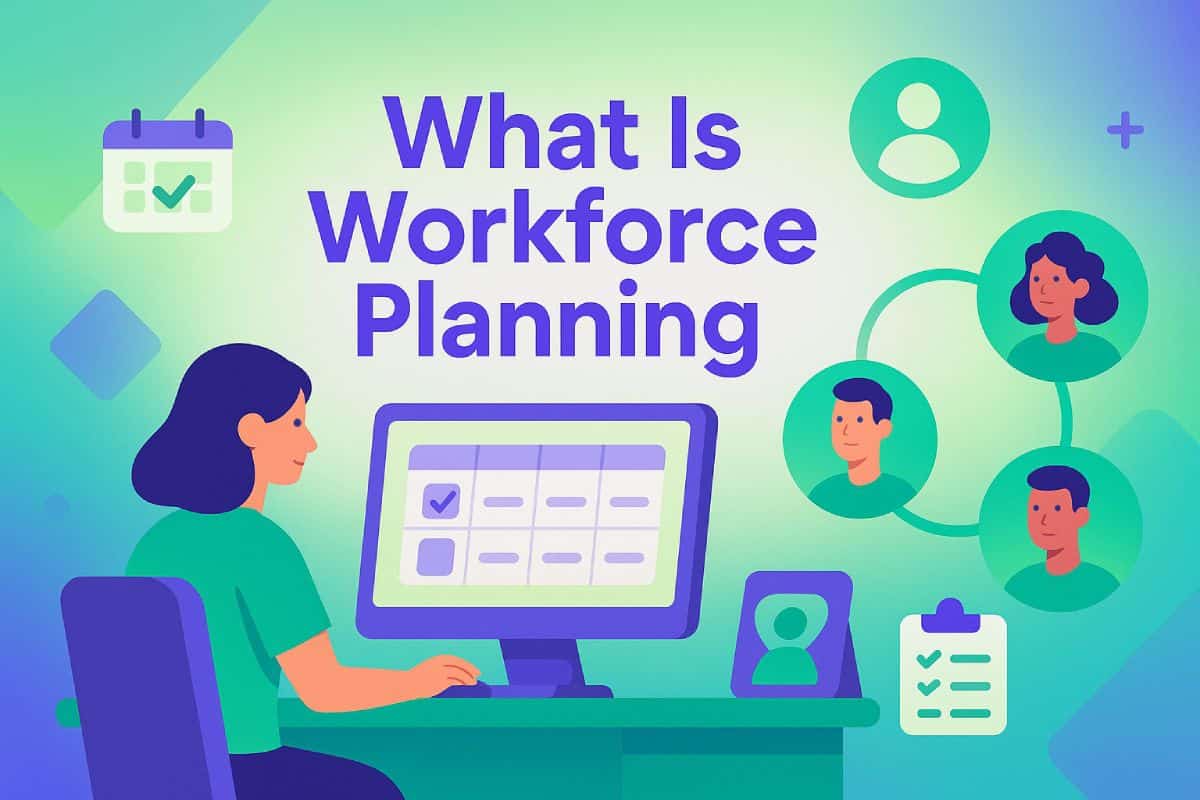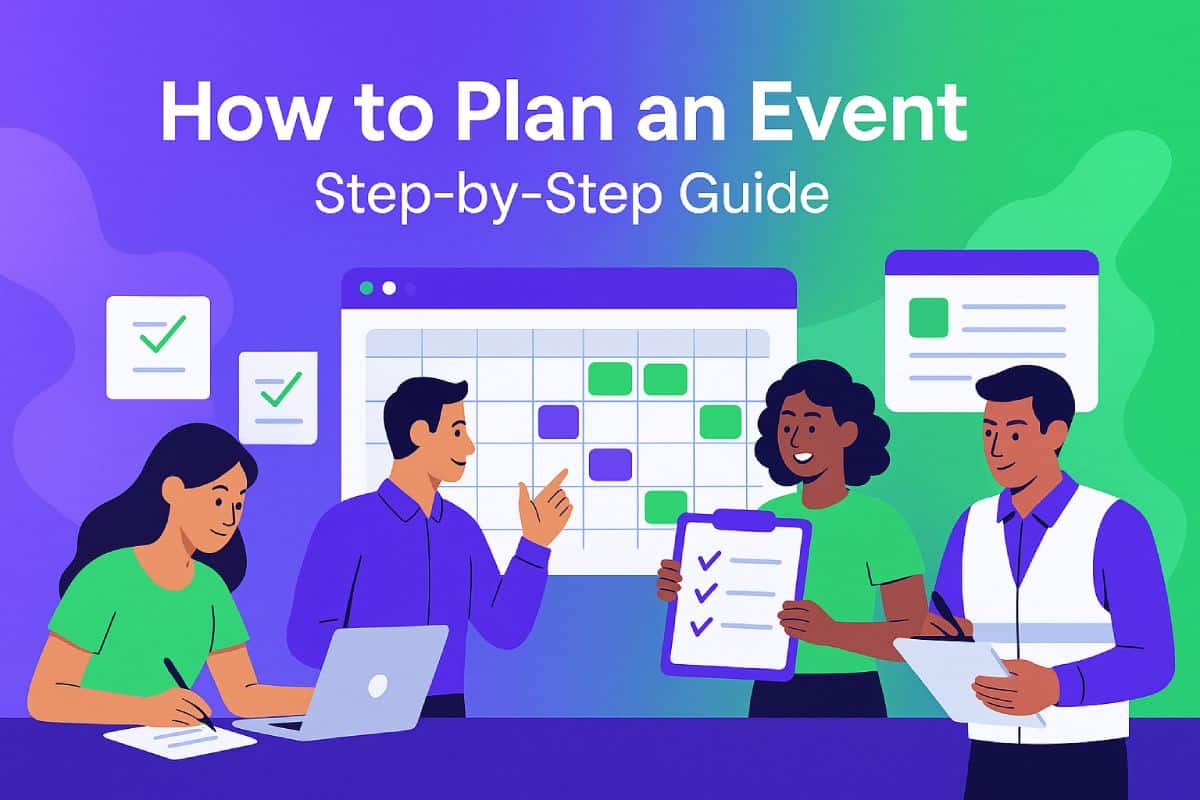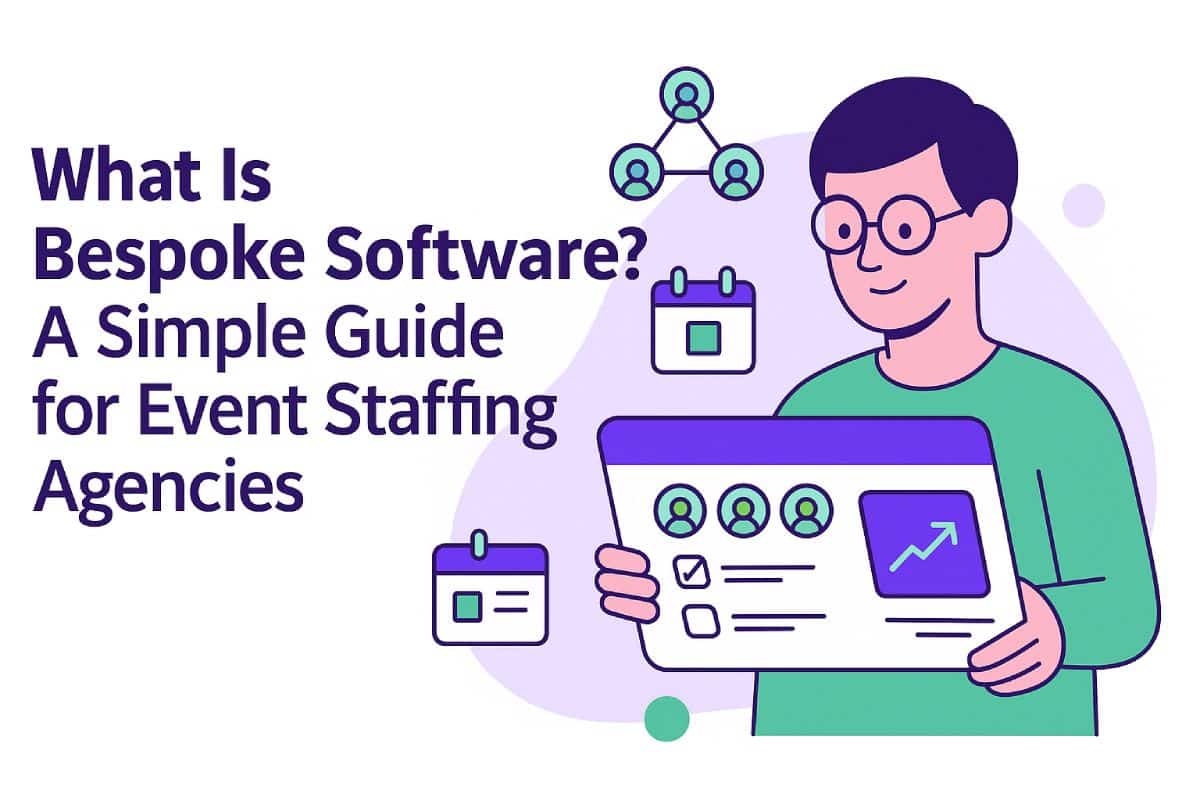Efficient scheduling is vital for event and hospitality staffing. Agencies depend on reliable systems that help manage fast-changing projects, large temporary workforces and multiple client demands. Employee scheduling software provides agencies with a structured way to plan shifts, organise teams, and maintain full operational control.
Employee scheduling software replaces spreadsheets and manual scheduling with automated tools designed to save time and reduce errors. It brings all scheduling tasks into one place so teams can plan work, share updates and keep every member of the workforce informed.
In this guide, we explain what employee scheduling software is, how it works and why event and hospitality staffing companies rely on it.
What employee scheduling software does
Employee scheduling software helps businesses plan, organise and manage shifts. It gives teams a central system to assign roles, monitor availability, review compliance documents and communicate updates.
For agencies managing temporary workers across multiple events, this type of software reduces admin pressure and supports smoother operations.
Employee scheduling software supports:
- planning rotas
- assigning staff across different locations
- managing staff availability
- preventing double-bookings
- communicating shift updates
- tracking time and attendance
- storing compliance files
- improving visibility across projects
It is a practical and dependable tool for agencies that work with large, flexible workforces.
Why agencies need employee scheduling software
Event and hospitality staffing operate at a fast pace. Schedules change daily. Staff work across several roles each week. Clients adjust requirements without warning. Manual processes cannot keep up with this level of complexity.
We rely on employee scheduling software because it brings structure to unpredictable environments and reduces time spent managing routine tasks.
It prevents scheduling errors
Double-bookings, forgotten updates and incorrect timings cause operational problems. Software reduces these issues by giving teams clear visibility of every shift.
It improves communication
Notifications and updates keep staff informed. This is especially important when working with temporary workers who rely on their phones for job information.
It simplifies compliance
Right-to-work documents, certifications, and onboarding information are stored in one system. This helps teams stay compliant and organised.
It supports multi-role staffing
Agencies often manage diverse teams including hospitality staff, promotional teams, front-of-house staff and event crew. Scheduling software helps match roles with suitable staff.
It saves time
Automation replaces many repetitive tasks. This frees teams to focus on operations and client delivery.
It gives clear visibility
Teams can track which events need more staff, which shifts are covered and where gaps remain.
Understanding modern scheduling tools
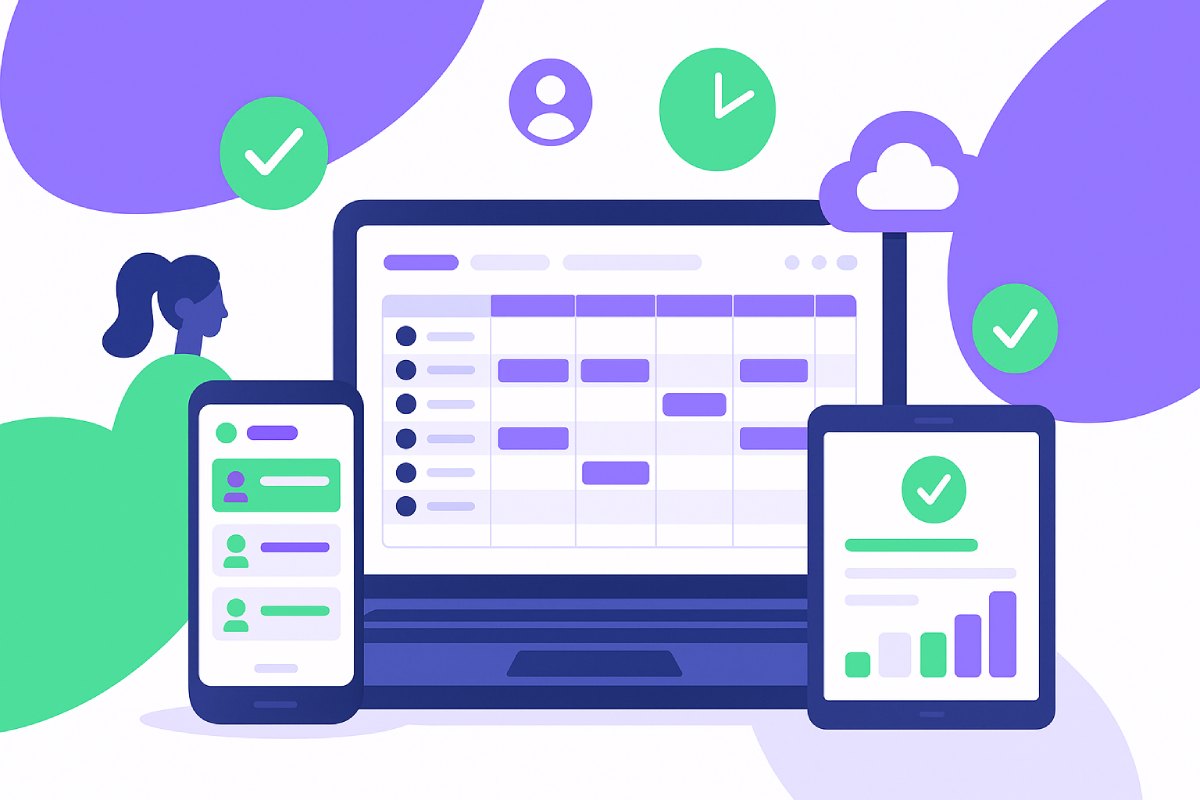
Modern employee scheduling tools come in several formats, each designed to help agencies organise staff with more clarity and speed. Some systems focus on building rotas and tracking availability, which is why many agencies refer to them as employee work schedule software or employee schedule management software.
Others highlight their ability to assign shifts across multiple locations, which leads to terms such as software to schedule employees or software for employee scheduling. Each description reflects a slightly different focus, but the purpose remains the same: to streamline staff coordination and support accurate rota planning.
Some platforms include mobile features to support temporary workers. These are often described as an employee scheduling software app, which allows staff to view shifts, accept roles and update details directly from their phones. Mobile access is especially important for event and hospitality teams who rely on quick communication.
Cloud-based systems are also widely used. Agencies often choose online employee scheduling software because it keeps everyone updated in real time and allows access from any location. This is useful when teams are working across several venues and projects at once.
Although these tools may be described in different ways, they all aim to give staffing agencies a reliable and organised approach to managing their workforce.
Why do you need employee scheduling software?
Employee scheduling software solves challenges that manual processes create. Without a centralised system, it becomes harder to track staff availability, manage compliance or handle schedule changes.
Temporary workers often update their availability daily. Events may run across several venues at the same time. Clients may need additional staff within hours. These operational realities make automation essential.
For event and hospitality agencies, employee scheduling software provides structure, reduces admin workload and supports reliable delivery. It ensures that the right people are in the right place at the right time.
What makes effective scheduling software?
Several features help make scheduling software reliable, and these elements often define the best employee scheduling software for event and hospitality operations.
Multi-project scheduling
Agencies work with several clients at once. Scheduling systems must support multiple events, time slots and locations.
Mobile communication
A strong employee scheduling software app ensures staff can respond quickly, view updates and stay informed wherever they are.
Compliance tracking
Right to work checks, certifications and document expiry dates must be easy to monitor.
Role and skill matching
Scheduling tools should highlight which team members suit each role.
Shift templates and workflows
Reusable templates reduce scheduling time for recurring events.
Real-time updates
Changes must be shared instantly to avoid confusion.
Clear visibility
Managers need a complete overview of staffing coverage across all projects.
Scalability
Agencies grow and take on larger workloads. Systems must scale with them.
These features help teams work more efficiently while maintaining high service standards.
How employee scheduling software supports temporary event work
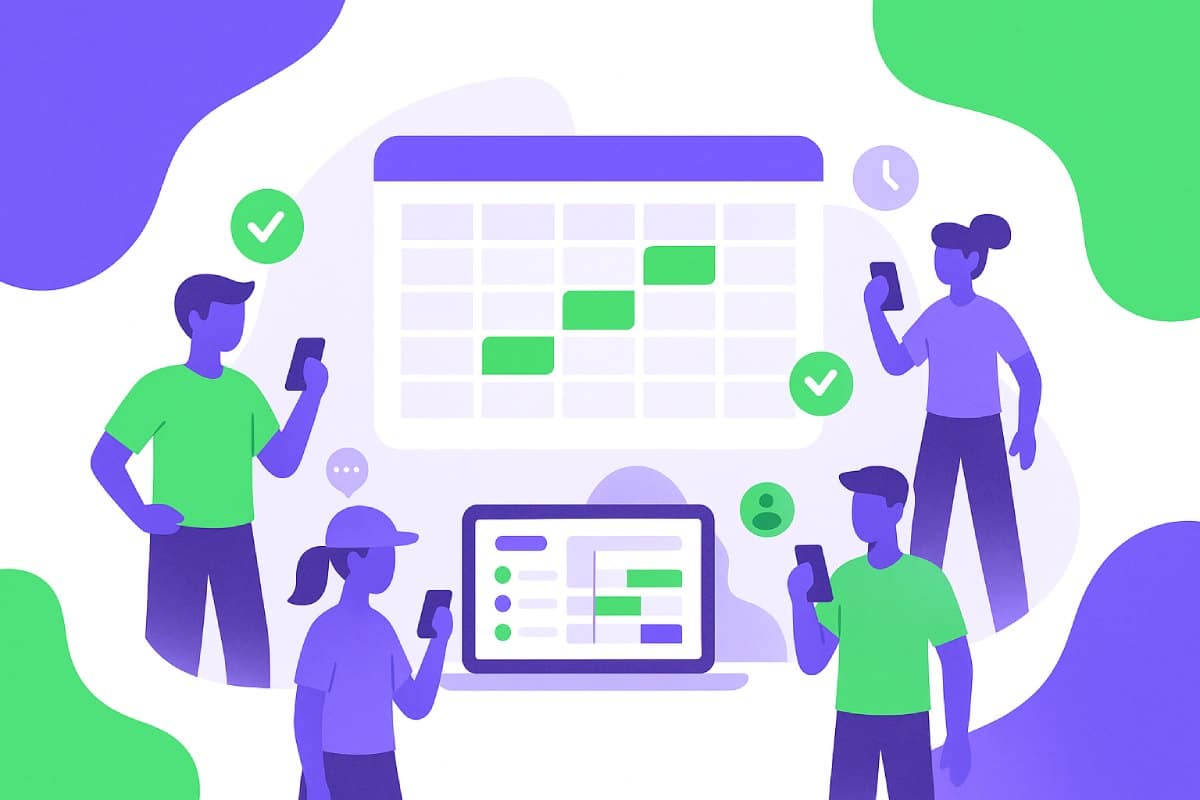
Temporary workers rely on fast communication, clear schedules and mobile-friendly tools. Agencies depend on accurate information and reliable coverage. Employee scheduling software creates a strong link between these two needs.
Better staff engagement
Workers receive instant updates, clear shift details and timely confirmations, which helps them stay connected, informed and confident about their upcoming work.
Reduced no-shows
Consistent communication, clear instructions and defined processes make it easier for staff to understand their responsibilities, leading to stronger attendance and fewer missed shifts.
Improved compliance
All documentation stays organised, accessible and up to date, giving managers full visibility of right to work checks and certifications across every project.
Faster shift allocation
Managers can review availability, match roles and fill shifts quickly, even during peak seasons, which keeps projects on track and reduces last-minute pressures.
Stronger operational control
Agencies gain a complete view of all schedules, staffing gaps and live updates across events, making it easier to manage large temporary teams with confidence.
Employee shift scheduling software in action
Many teams refer to specialised tools as employee shift scheduling software. This highlights the system’s role in managing specific time slots, roles and workforce availability.
Shift scheduling plays an important part in hospitality, where teams rotate frequently, work varied hours and respond to seasonal demand. Employee shift scheduling software helps maintain structure even when shifts change rapidly.
It is equally valuable for event staffing, where schedules must adjust to rehearsals, build days, live event hours and breakdown periods. Software keeps the workforce organised throughout the full event lifecycle.
Scheduling for different business sizes
The flexibility of modern tools means agencies of all sizes can benefit. Larger agencies often need detailed multi-project management, while smaller businesses may need simple but scalable tools.
This raises questions such as which employee scheduling software is best for startups. In these situations, teams typically look for tools that:
- are easy to adopt
- require little training
- work well for small teams
- scale as the business grows
- offer mobile access from day one
This approach ensures continuity and long-term efficiency.
Employee scheduling software in the UK
Agencies working in the United Kingdom often look for employee scheduling software UK that supports local compliance requirements, regional hiring needs and mobile-first teams.
A strong UK-focused system must make right-to-work checks simple, keep documentation organised and support smooth onboarding for temporary staff across hospitality venues, stadiums, festivals and live events.
Liveforce is built with these needs in mind, offering clear compliance tracking, a mobile crew app and reliable scheduling tools that match the pace of UK event and hospitality staffing.
This helps agencies stay organised, cover shifts confidently, and maintain consistent workforce standards across every project.
Evaluating what is the best software for making employee schedules
Many teams seek tools that help them work faster, reduce errors and improve communication. When evaluating what is the best software for making employee schedules, agencies often look for:
- accuracy
- mobile access
- compliance support
- easy rota creation
- fast updates
- scalability
- clear reporting
A platform that supports all these areas becomes central to efficient operations.
How Liveforce supports event and hospitality scheduling
Liveforce is built specifically for event and hospitality staffing. We designed our platform to support the pace, complexity and demands of temporary workforce management.
Strong multi-project scheduling
We give agencies the ability to schedule large teams across several clients at once.
Mobile-first experience
Crew use the Liveforce App to view shifts, confirm work and receive notifications. This improves communication and reduces missed updates.
Compliance tracking
Documents, certifications and right to work details can be uploaded,
Real-time updates
Managers can make changes instantly, and staff receive them straight away.
Clear visibility
We provide an overview of all events, shifts and workforce activity in one place.
Designed for temporary workforces
Every feature supports the way event and hospitality staffing teams operate.
With clear workflows, mobile communication and strong visibility, it becomes a vital part of daily operations.
We build our platform around the real needs of agencies working across events, hospitality and experiential projects. If you want a scheduling system that supports your temporary workforce with efficiency and clarity, we can help.
FAQs
What is employee scheduling software?
Employee scheduling software is a digital tool that helps agencies plan, organise and manage staff rotas. It reduces manual admin by centralising shift details, availability, compliance information and communication.
Why do event and hospitality agencies use employee scheduling software?
Agencies use employee scheduling software to manage fast-moving schedules, large temporary workforces and frequent shift changes. It improves accuracy, visibility and communication across every event.
How does employee scheduling software support compliance?
Employee scheduling software stores documents, tracks certification dates and helps teams stay up to date with right to work requirements. This reduces risk and keeps every shift compliant.
What features should staffing agencies look for in scheduling software?
Agencies benefit from mobile access, multi-project scheduling, skills matching, real-time updates and compliance tracking. These features help teams deliver reliable staffing across events and hospitality venues.
How does Liveforce support employee scheduling for temporary staff?
Liveforce gives agencies a full scheduling system built for event and hospitality teams. It includes multi-project rota management, a mobile crew app, compliance tracking and instant updates for smooth workforce operations.

